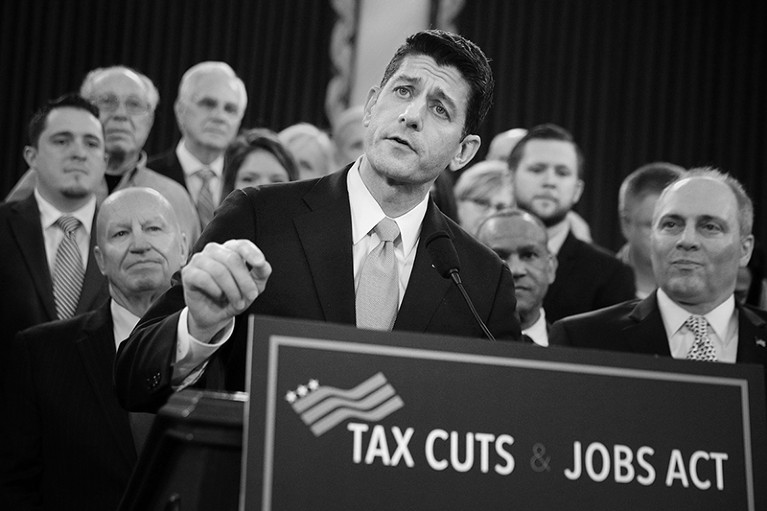
US Speaker of the House, Republican Paul Ryan, speaks at a news conference on tax reform.Credit: Alex Wong/Getty
Doing a PhD is a classic exercise in delayed gratification. While classmates enter the workforce and start putting money into retirement plans, students who enrol in graduate school face many years of long hours, teaching requirements and weekends running experiments that can’t wait. Someday, perhaps, an advanced degree will land them a more lucrative and rewarding job.
Meanwhile, none of that work is well compensated. In the United States, according to the US Department of Education’s latest data, from 2011 to 2012, more than half of graduate students make less than US$20,000 a year. For reference, the federal poverty line for a single person without children is $12,060. Living in an expensive region such as Boston, Massachusetts, or the San Francisco Bay Area in California is especially tough. For example, graduate stipends at the US National Institutes of Health (NIH) are capped at $23,844 and are not adjusted for cost of living. To help out, universities often waive tuition fees, which can sometimes be more than a student’s income.
The last thing that graduate students need is a tax hike. But that is what many would face under a clause in the federal-tax-reform bill passed by the US House of Representatives last week. It will now need to be reconciled with the Senate’s tax-reform bill (which retains many existing student tax benefits), and signed by the president.
The 429-page tax plan — which President Trump reportedly tried to christen the “Cut, Cut, Cut Act” because it would ostensibly shrink taxes for many — would require students to report tuition-fee waivers as taxable income, moving the students into a higher tax bracket. Graduate students, who receive the lion’s share of tuition waivers, would be most affected. And 60% of the 145,000 students who get tuition reductions each year are working in science, engineering, technology and mathematics fields, the US Department of Education estimates.
The amount of money that the government would reap from these taxes would be minuscule, given the $20.5-trillion national debt. But it could weigh heavily on young scientists. Take a hypothetical PhD student at the Massachusetts Institute of Technology (MIT) in Cambridge, in receipt of a $23,844 NIH stipend. Under the current system, she would pay very little in taxes. The new law would add her $49,000 MIT tuition bill to her taxable income as though she were paid a $73,000 salary — an amount she never actually sees. This would add thousands of dollars to her tax burden.
This example is extreme — most graduate schools’ tuition fees are closer to $16,000 — but it is safe to say that many students could see their tax rate rise. Students who attend public universities outside their home states would be especially hard hit: out of state, tuition can cost double what it does in-state. The bill would also eliminate a tax benefit that allows people with low incomes to deduct student-loan interest from their taxable income.
Higher taxes could be one more disincentive to pursuing an advanced degree, given the already bleak prospects in an oversaturated academic job market and the flat budgets at science-funding agencies. The prospect of a steady income in a less-skilled job might seem that much more attractive to a new graduate than years of even greater penury. The loss of talented graduate students would be a blow to universities and industries that depend on scientists with higher degrees, and to science overall.
The Trump administration and other Republicans in Congress are probably not trying to discourage graduate study or undermine science. The goal of the bill’s authors is to maintain revenue while lowering taxes on businesses; universities are just one of its targets. Students and other people who are above the poverty line, but on low-to-middle incomes, are likely to shoulder much of the burden.
Still, the provision is indicative of the growing disregard for intellectualism and expertise that has become prominent among policymakers in recent years. Rhetoric about valuing US competitiveness and entrepreneurship is undermined by actions that do not account for the realities of how those dreams are achieved.
The current effort to overhaul the US tax system, if successful, would mark the first major tax reform since 1986. It is no doubt an excruciatingly complex task, and nothing that lawmakers produce will be perfect. But if the result penalizes bright, underpaid young people, what will be “cut, cut, cut” will include the positive economic and social impact of scientific research in the United States.





